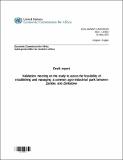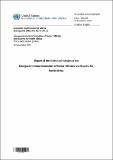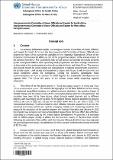Natural gas: Africa's energy transition accelerator

View
Download
Published
2020Author(s)/Corporate Author (s)
United Nations. Economic Commission for Africa;United Nations. Economic Commission for Africa;
Metadata
Show full item recordAbstract
Latest assessments of Africa’s electricity sector show the progress being made, despite the underlying structural challenges. More Africans have access to electricity than before, currently fewer than 600 million people still cannot access electricity. However, progress must accelerate to connect millions more and close the daunting remaining gap. The energy sector of Africa is facing major transformation, in the face of expected quadrupling of demand by 2040. Under the scenario of progress envisaged in the African Union’s Agenda 2063, electricity supply is expected to expand by 600 GW of new capacity and demand to exceed 1,700 terawatt hours (TWh) (IEA, 2019). These bring both a significant financing challenge and new opportunities for Africa to shape its energy future. There are varying assessments of the direction that Africa’s energy future will take. Latest analyses indicate that renewable energy will account for nearly 60 per cent of future capacity, and that the share of natural gas in electricity generation will rise to 30 per cent in Sub-Saharan Africa, from the current average share of under 5 per cent. Under this view, a combination of solar, wind and hydro energy and a calibrated role for natural gas is expected to drive the future direction of energy-sector transformation. It is within this context that this paper takes a closer look at the role of natural gas in powering Africa’s energy future.
Citation
“United Nations. Economic Commission for Africa; United Nations. Economic Commission for Africa (2020). Natural gas: Africa's energy transition accelerator. Addis Ababa. © UN. ECA. https://hdl.handle.net/10855/43686”Collections
- Natural Resources Management [2812]
Related items
Showing items related by title, author, creator and subject.
Draft report Validation meeting on the study to assess the feasibility of establishing and managing a common agro-industrial park between Zambia and Zimbabwe
United Nations. Economic Commission for Africa; United Nations. Economic Commission for Africa. Subregional Office South Africa (SRO-SA); United Nations. Economic Commission for Africa; United Nations. Economic Commission for Africa. Subregional Office South Africa (SRO-SA)
“United Nations. Economic Commission for Africa; United Nations. Economic Commission for Africa. Subregional Office South Africa (SRO-SA); United Nations. Economic Commission for Africa; United Nations. Economic Commission for Africa. Subregional Office South Africa (SRO-SA) (2021-05). Draft report Validation meeting on the study to assess the feasibility of establishing and managing a common agro-industrial park between Zambia and Zimbabwe. Addis Ababa :. © UN. ECA,. https://hdl.handle.net/10855/47759”
Report of the thirty-sixth session of the Intergovernmental Committee of Senior Officials and Experts for North Africa
United Nations. Economic Commission for Africa; United Nations. Economic Commission for Africa. Sub regional office for North Africa; United Nations. Economic Commission for Africa; United Nations. Economic Commission for Africa. Sub regional office for North Africa
“United Nations. Economic Commission for Africa; United Nations. Economic Commission for Africa. Sub regional office for North Africa; United Nations. Economic Commission for Africa; United Nations. Economic Commission for Africa. Sub regional office for North Africa (2021-12). Report of the thirty-sixth session of the Intergovernmental Committee of Senior Officials and Experts for North Africa. UN. ECA Intergovernmental Committee of Senior Officials and Experts for North Africa (36th sessions : 2021, Nov. 24 : Addia Ababa, Ethiopia). Addis Ababa :. © UN. ECA,. https://hdl.handle.net/10855/47917”
Concept note
United Nations. Economic Commission for Africa. Subregional Office West Africa (SRO-WA); United Nations. Economic Commission for Africa; United Nations. Economic Commission for Africa; United Nations. Economic Commission for Africa. Subregional Office West Africa (SRO-WA)
“United Nations. Economic Commission for Africa. Subregional Office West Africa (SRO-WA); United Nations. Economic Commission for Africa; United Nations. Economic Commission for Africa; United Nations. Economic Commission for Africa. Subregional Office West Africa (SRO-WA) (2022-08). Concept note. UN.ECA Intergovernmental Committee of Senior Officials and Experts for North Africa (1st Joint Session: 2022, Nov. 1-3: Marrakech, Morocco); UN.ECA Intergovernmental Committee of Senior Officials and Experts for West Africa (1st Joint Session: 2022, Nov. 1-3: Marrakech, Morocco). Addis Ababa :. © UN. ECA,. https://hdl.handle.net/10855/49128”



